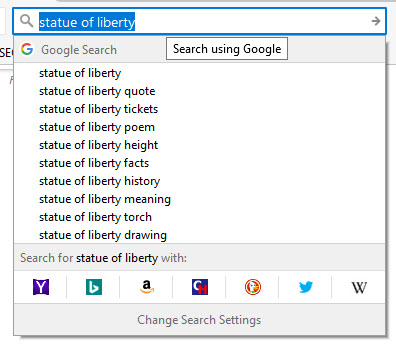
People search from many different places, and the things that they search for at some places may show up in search results as query suggestions. A recent Google patent tells us more about how the search engine might use information gathered from searches at different locations to help other searchers…
When you perform a search on a search engine, in addition to search results that provide links to web pages, images, videos, and news articles you may also be shown query suggestions or query refinements that enable you to see related results. These might appear in a list at the bottom of the search results you see, or they could be listed in a drop-down from a search box, as you type on a query. For instance search for “Statue of Liberty” and you may see at the bottom of search results a set of related searches that look like this:
Related Content:
Searches related to the statue of liberty
- statue of liberty facts
- statue of liberty crown
- statue of liberty information
- statue of liberty height
- statue of liberty meaning
- statue of liberty inscription
- statue of liberty ferry
- statue of liberty france
In addition to a list like that, a dropdown list may show from a search box, like this:

These are intended to satisfy searchers’ informational needs or to refine a search or search strategy.
Google was granted a patent this week on query suggestions that focus upon queries that people search for at specific locations. These are “query suggestions based on a category associated with a location where the query was issued.”
If someone searches from a “point of interest” (POI), such as “a store, a museum, a tourist attraction, a park, a government building,” the search engine may collect query log data about that query and that location.
For example, if people are searching from electronics stores, to find out about TVs or other electronic appliances, what they are searching for at those POIs might be helpful to other people searching for those places. The patent illustrates this:
In selecting query suggestions for a received query prefix, a search system can consider a category associated with a location of a user. For example, users 105a and 105c are located near or in electronics stores. Thus, a search system can provide query suggestions associated with an electronics store category, e.g. “electronics.” Query suggestions 130a and 130c for query prefix “te,” e.g. “television,” “television brands,” and “television set,” are thus related to the category “electronics” associated with locations 115a and 115c. On the other hand, user 105b is located inside a home goods store. Thus, a search system can provide query suggestions associated with a home goods store category, e.g. “tea.” Query suggestions 130b for the same query prefix “te,” e.g. “tea,” “tea party,” and “tea press,” are thus related to the category “tea” associated with location 115b.
The patent tells us that the advantages of the process found in this patent are:
- By considering categories associated with locations where queries were issued, a search system can provide query suggestions that are more likely to result in users finding resources that satisfy their informational need.
- Providing location-relevant query suggestions can also save users time by reducing the need to enter long queries.
- The query suggestions can also help users formulate queries that match their need and can provide other queries that the user would find interesting or useful.
The patent is:
Local query suggestions
Inventors: David Kogan and Daniel G. Koulomzin
Assignee: Google
United States Patent 9,626,454
Granted: April 18, 2017
Filed: July 13, 2015
Abstract
Methods, systems, and apparatus, including computer programs encoded on computer storage media, for providing query suggestions. One of the methods includes receiving query log data that identifies a query and a location where the query was issued. A point of interest near the location where the query was issued is identified. A category of the point of interest near the location where the query was issued is identified. The query is associated with the category of the point of interest near the location where the query was issued.
The patent tells us that it might rank queries associated with one of these categories by how often it is searched for. So, if lots of people search from an electronics store for “television”, that might be a highly ranked query suggestion in that geographic location:
In some implementations, the system computes the multiplier M by comparing an expected or overall frequency of a query to a category-specific query frequency that represents a frequency of the query for queries received near locations associated with the category. For example, the overall frequency of a particular query “television,” maybe 1 query in 10,000. If the category-specific frequency of the received query “television” for queries received from locations associated with the category “electronics” is more than, e.g. double, triple, or 100 times, the overall frequency, the system can compute a multiplier M that promotes the rank of the query suggestion “television” when provided for a query prefix submitted near a location associated with the “electronics” category. On the other hand, if the category-specific frequency of the received query from locations associated with the category “electronics” is less than, e.g. half, one-tenth, or one hundredth, the overall query frequency, the system can compute a multiplier M that demotes the rank of the query suggestion “television” for a query prefix submitted near a location associated with the “electronics” category.
We are provided more details on how Google might use query log data associated with searches performed at different locations to provide query suggestions. Given people performing searches on mobile devices from store showrooms; this may be useful information. Very interesting how Google is changing search results based upon how searchers are changing how they search (and from where).
Search News Straight To Your Inbox
*Required
Join thousands of marketers to get the best search news in under 5 minutes. Get resources, tips and more with The Splash newsletter: